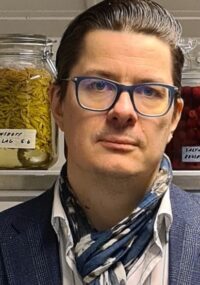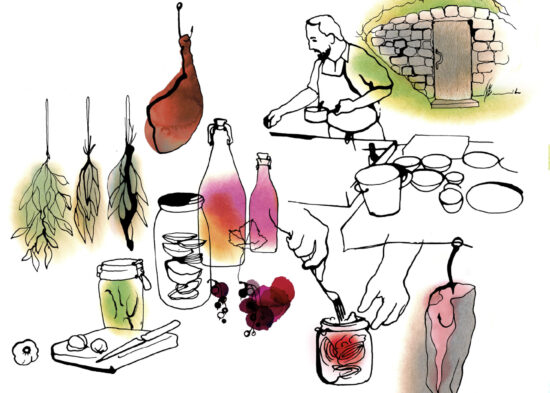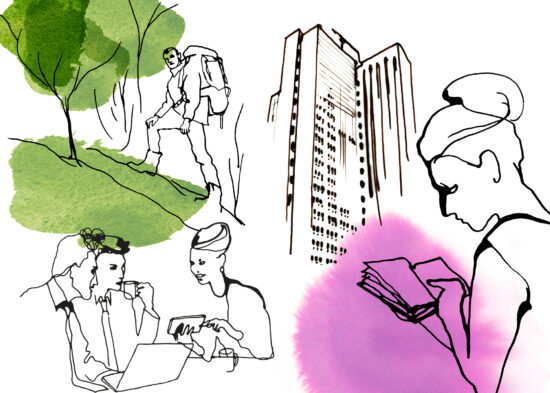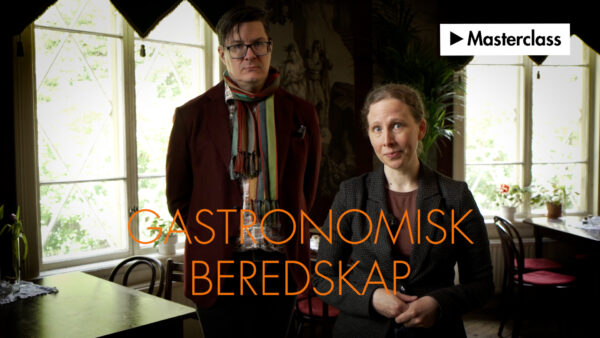Results from the project
BFUF Rapport #30 Gastronomisk beredskap – från lyx till nödvändighet, hållbar framtid med nygamla konserveringsmetoder
New Nordic Cuisine in practice: Storage and preservation practices as a means for a resilient restaurant sector
BFUF Play
Matilda Marshall, Senior Lecturer in Ethnology, Umeå University
Joachim Sundqvist, Senior Lecturer in Food, Nutrition and Meal Science, Umeå University
If the restaurant industry made greater use of older techniques for storing and preserving food, would this contribute to a reduced carbon footprint? And what does the sector know about food management in past times, when fresh food was not commonplace but was preserved to last all year round? Matilda Marshall and Joachim Sundqvist at Umeå University will examine the opportunities, benefits and challenges of long-term food storage in the hospitality industry.
What is the project about?
– The project is based on Swedish food culture. Traditionally, we have preserved and stored food in, for example, root cellars to keep it for a year or more. With refrigeration technology and the modernisation of society, the way we eat and store food has changed. And thus also the food served in restaurants. We will study whether our food culture can be a resource for the sustainability efforts of the hospitality industry, with a particular focus on how to implement traditional ways of handling food in a modern organisation.
Why does the hospitality industry need this?
– Sustainability is high on the agenda in the hospitality industry. This industry, like others, must meet environmental targets and sustainability challenges. Some gastronomy actors, especially those active within the New Nordic Cuisine, are already using local ingredients and traditional preservation and storage methods. However, this is still on a small scale. There may be opportunities here to scale up to contribute to the green transition by reducing deliveries, imports, food waste and electricity consumption.
What are you going to do?
– We will conduct interviews with three different groups. The first one is restaurant businesses that work with preservation and long-term storage of food on a fairly large scale today. The second is slightly larger organisations that work with this very little or not at all, and the final group is wholesalers. A total of 18 organisations, three in each category, will be asked about the challenges and opportunities they see in different methods and ways of storing and purchasing food. We will use ‘fridge stories’ where participants will guide and show us on site how they store their food. This tends to open the way for reflection, which is important as knowledge and experience can be difficult to express in words. If you show what is stored and how, it becomes very concrete. We also want to capture the knowledge of food history and culture in the sector.
Challenges
– The current inflation and the war in Ukraine may make it more difficult for us to access the respondents. We also know that some restaurants that worked with the methods we are interested in have closed down for various reasons in recent years, which have been tough for the industry.
What result do you hope for?
– Our hope is to contribute to the hospitality industry with new and useful ways of thinking and working, to inspire people to handle food using traditional and perhaps forgotten techniques. We also hope that the project can lead to an increased interest in food culture in gastronomic education, both in the country’s three academic programmes and at secondary school level. This is where many of the industry’s future employees and leaders can be found.
Reference group
Håkan Jönsson, Associate Professor in Ethnology, Lund University and Visiting Professor at SLU, Alnarp
Annechen Bahr Bugge, PhD in Sociology and Research Professor, Consumption Research Norway SIFO, Oslo Metropolitan University, Norway
Thomas Fankl, Director Food and Beverage, Scandic Hotels
Michaela Saax, buyer at Smakriket, part of Grönsakshallen Sorunda/Martin Servera
Eldrimner, the national resource centre for food crafts
Ola Albrektsson, Managing Director of AgroÖrebro, a development arena and meeting place for agricultural and food businesses in Örebro County.
Project facts
Project
Supply management in a green restaurant industry – conditions for a reinvented meal culture
Research organization
Umeå University
Project Manager
Matilda Marshall
Members
Joachim Sundqvist
Period
Apr. 2023 – Feb. 2025
Amount
SEK 1,170,000
Contact
Matilda Marshall
Senior Lecturer in Ethnology
Photo: Hans Karlsson/Umeå University

Joachim Sundqvist
Senior Lecturer in Food, Nutrition and Meal Science
Photo: Umeå University




